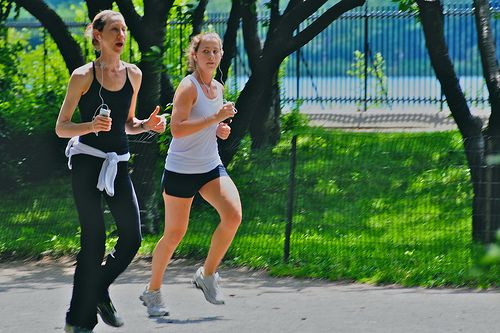Aerobic Exercise Boosts Memory In Older Adults After As Little As 6 Weeks Of Working Out

Sedentary adults over 50 may want to stop lifting the remote and get off the couch. Older adults who engage in aerobic exercise could boost their memory, brain health, and physical fitness, according to a recent study.
Age-related memory loss is a common complaint among the older adults. Memory lapses can become downright frustrating but they are typically not a cause for concern. With aging, memory function is influenced by physiological changes that can cause glitches in brain functions as it takes longer to learn and recall information. Life Extension says the hippocampus — a region of the brain involved in the formation and retrieval of memories — often deteriorates as adults age, whether they have dementia or not.
Additionally, hormones and proteins in the body that specifically protect and repair brain cells and stimulate neural growth are also found to decline with age. Older adults may show a decline in their cognitive skills due to decreased blood flow to the brain, which can also impair memory, according to Psychology Today.
Publishing in the journal Frontiers in Aging Neuroscience, researchers at the Center for BrainHealth at The University of Texas at Dallas investigated the effects of physical training on a person’s memory. Thirty-seven sedentary adults between the ages of 57-75 were randomized into a physical training or a wait-listed control group in the study. The participants all had a physical exam and were screened for dementia, early cognitive impairment, depression, and intelligence quotient (IQ) prior to the study.
The physical training group partook in supervised aerobic exercise on a stationary bike or treadmill for one hour, three times a week for 12 weeks. This group’s cognition, resting cerebral blood flow, and physical fitness were measured at three time points: before beginning the physical exercise regimen, mid-way through, at 6 weeks, and post-training at 12 weeks.
To detect blood flow in the brain, the researchers used non-invasive arterial spin labeling (ASL), which can detect brain changes much earlier than before.
Engaging in aerobic exercise was found to result in a higher resting cerebral blood flow in the brain’s anterior cingulate region when compared to the participants in the control group. The anterior cingulate region is associated with better memory functions and has been linked to better cognition late in life. The exercisers also saw an improvement in memory performance. Gains were seen in sedentary adults who started exercising as early as six weeks.
Sandra Bond Chapman, Ph.D., founder and chief director of the Center for BrainHealth, and lead author of the paper, believes that utilizing the noninvasive brain imaging techniques helped her team identify brain changes earlier than memory improvements, according to Medical Xpress. This finding suggests brain blood flow may be used as a measure of brain health for patients who suffer from memory loss conditions. Although physical exercise was associated with regional brain blood flow, it was not enough to warrant a change in global brain blood flow.
"Physical exercise may be one of the most beneficial and cost-effective therapies widely available to everyone, to elevate memory performance," Dr. Chapman said in the press release. "These findings should motivate adults of all ages to start exercising aerobically."
Limitations in the study included the relatively small sample size. The researchers acknowledged that the benefits in memory, brain health, and physical fitness could be attributed to social engagement rather than the physical training alone.
In a similar study published online in the journal Cerebral Cortex, researchers at the Center for BrainHealth, at The University of Texas in Dallas, found complex cognitive training significantly improved cognitive brain health in seniors. One-hour sessions of directed brain training — regularly exercising the brain with tests and puzzles to improve brain skills and everyday thinking tasks — every week for 12 weeks altered brain function, promoted increased blood flow, enhanced communication across key brain regions, and expanded connections between these regions related to new learning.
A combination of physical and mental exercise could be an effective health measure to improve a person’s overall brain health. Brain training could possibly serve as a protective factor against the onset of Alzheimer’s disease, which affects more than five million Americans, according to the Alzheimer’s Association.
To learn how to tell the difference between age-related memory loss and Alzheimer’s, click here.
Sources:
Aslan S, Chapman SB, and DeFina LF, et al Shorter Term Aerobic Exercise Improves Brain, Cognition, and Cardiovascular Fitness in Aging. Front. Aging Neurosci. 2013.
Aslan S, Chapman SB, and DeFina LF, et al Neural Mechanisms of Brain Plasticity with Complex Cognitive Training in Healthy Seniors. Cereb. Cortex. 2013.
Published by Medicaldaily.com



























